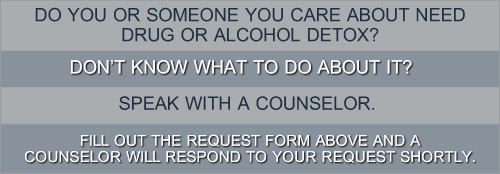
A Substance Abuse Treatment Plan Must Be Started Immediately Following Detox
Drug and alcohol detoxification (detox) is required when there has been prolonged use of alcohol or one or more prescription or street drugs and an individual has made a decision to get help for substance abuse. Some people may think that if they can just get through detox and get the drugs or alcohol completely out of their system they can handle it from there and stop using drugs or drinking. Is detox enough to stop using or drinking? The answer to that is a big no.
Drug and alcohol addiction is considered to be one of the most challenging problems of public health issues facing our nation. According to the National Institute on Drug Abuse (NIDA), addiction is a chronic disease with an extremely high relapse rate within the first year for individuals who have gotten clean and sober. Addiction is a life-long battle that must be consciously fought by the individual trying to live a drug-free life. Addicts must learn how to deal with the temptations they will ultimately come across after they become clean and sober and may experience powerful cravings for drugs or alcohol months and even years after they stop using. It is estimated that about 80 to 85% of individuals will relapse within the first year after detox.
Detox is a difficult process, particularly for individuals with a severe level of dependency on one or more drugs and long-term drug use. The physical symptoms of withdrawal take an emotional toll on the individual as they can be quite agonizing as well as pose serious health risks. The effects of drug withdrawal, which can last from a couple of days to a couple of weeks, can include nausea and vomiting, pain, the shakes and restlessness, inability to sleep and hallucinations, just to name a few. Alcohol withdrawal has similar symptoms and with severe addiction people go through what is commonly referred to as the DTs (delirium tremens). Individuals who can actually recall the experience have said it is a feeling like there are bugs crawling all over their body, flashes of light, seeing things that aren't there, panic attacks and the feeling that they are going to die. Detox is a serious business and should only be done with the help of trained professionals. Psychological and emotional symptoms that an individual will face during withdrawal are also extremely important and must be addressed. Individuals may not be able to handle the physical or emotional aspects of the withdrawal and could become violent or desperate posing a threat to themselves or others.
One would think that the unpleasant nature of the detoxification process would be enough to sway any individual to never use drugs or drink again; however, this is not the case. The overpowering hunger for drugs or alcohol that is felt by the addict, even after all traces of drugs or alcohol are removed from the body, are a constant temptation that requires on-going therapy and help. It is possible for a former addict to stay clean and sober but it takes a lot of therapy, support, determination, willpower and perseverance. It is extremely important for an individual to have a substance abuse treatment plan in place that will begin immediately following drug or alcohol detoxification.
- Questions?
